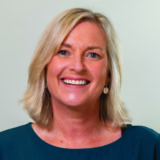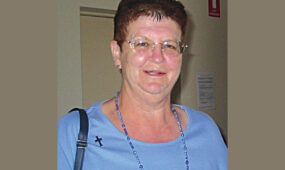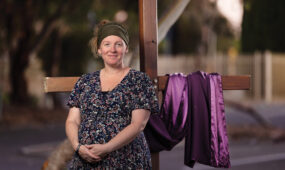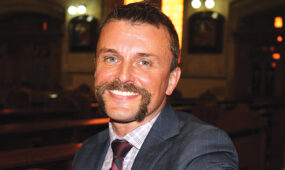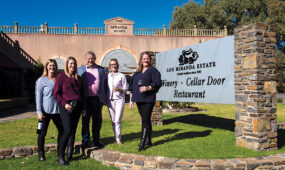Proud to be part of schools growth
People
Long-serving education leader, Professor Denis Ralph, will step down as chair of the South Australian Commission for Catholic Schools later this month. He spoke to LINDY McNAMARA about the growth and achievements of Catholic education over the past decade and why it is now positioned as an educator of choice for many families in the State.
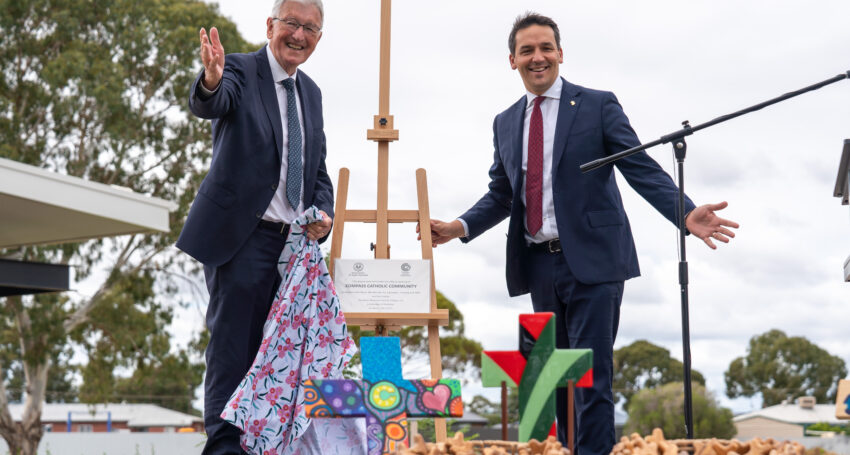
Always speaking with confidence and clarity about the vision for Catholic education in South Australia, Professor Denis Ralph has a slight quiver in his voice when he pinpoints the one project that he will treasure most from his 11 and a half years as chair the South Australian Commission for Catholic Schools (SACCS).
While immensely proud of passing the milestone of 50,000 students attending Catholic schools, introducing a scholarship program for children in care, and successfully lobbying the State Government for capital works funding, it is a thriving new campus at the north of the city that pulls at the heartstrings.
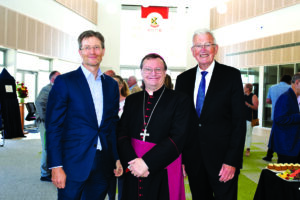
Prof Ralph with Archbishop O’Regan and Michael Hickinbotham at the Two Wells campus opening in 2021.
The Two Wells campus of Xavier College is special to him for two reasons. First, that the initial decision to build the school resulted largely from his long connection with the Hickinbotham family which was developing the Liberty housing estate and secondly, that the school is a legacy to the outstanding leadership of Catholic principal Lynn Martin.
As Prof Ralph explained, it was a phone call from developer and friend Michael Hickinbotham that set the wheels in motion for the Two Wells Campus of Xavier College to proceed, with the incentive that 12.75 hectares of land for the site – worth more than $12 million – be gifted to CESA, but there was a catch as the school had to be completed within 12 months.
Advertisement
“I had already been thinking about that area. There was no Catholic school in cooee…and I could see a real need there,” Prof Ralph said.
Miraculously after only one year, Stage 1 was completed on time and the school opened its doors to 145 students at the start of 2021, with current enrolments at nearly 600.
“God meant that to happen,” he said, proudly adding that now two years later Stage 2 has also been completed and the building of sports facilities is currently underway.
“We have a vision that the school will one day have 1200 students and there will be an international horticultural centre based there.”
However, it was the person who was missing from the campus opening that causes Prof Ralph’s voice to falter. Mr Martin, who was principal of Xavier College when the initial negotiations with Hickinbotham began, tragically succumbed to cancer in May 2020. Fittingly, his legacy lives on as the main building at Two Wells is named after him.
Advertisement
“I remember having a drink with Lynn at the East End Cellars and when we were driving home I said, I have something to tell you that will be a bit of a surprise to you,” Prof Ralph recalled.
“I told him I wanted the new school to be a campus of Xavier and you’ll be the head, so are you okay with that and do you think your community will be okay with that?
“And Lynn looked at me as we were driving along and said, ‘Denis that’s great, thank you for that, but I don’t think I’ll be there’. And he wasn’t. Sadly, Lynn passed away on May 14 2020.”
Reflecting on taking over as chair of SACCS in 2012, Prof Ralph said he and the late Archbishop Philip Wilson shared a vision to “transform Catholic education in SA”.
“We wanted to make sure we transformed the system so it was the best it could be in Australia.”
Now more than a decade later he believes that with record numbers of students and building developments and the quality of teaching and learning on offer, Catholic education in SA is in a very good place.
For example, last year alone there were 17 blessings and openings of new buildings around the State.
Prof Ralph said some of the major developments under his watch have included the new St Francis of Assisi College at Renmark – which is now serving feeder parish schools in Berri, Loxton, Barmera and Renmark – and the innovative Compass Catholic Community that is providing an educational pathway for 17 to 24 year olds.
He described the latter as a “a very bold example of looking outside the square” and said the school was the culmination of many years of discussions with Archbishop Wilson and then Vicar General Philip Marshall who were concerned the Church wasn’t doing enough to support young people in the northern suburbs who had left mainstream education for a variety of reasons.
Another example of “being ahead of the pack” was the decision by the Commission to move Year 7 into secondary settings starting in 2019, well before the State Government started the process. Prof Ralph said the successful achievement of this transition was due to the outstanding leadership of CESA director, Dr Neil McGoran, and Catholic school principals.
This also led to the formation of R-9 schools in locations such as Wallaroo, Peterborough and Murray Bridge, thus allowing rural students to continue a Catholic education until Year 10 and delaying the possibility of boarding school until the student was older.
As the driver of a school bus during his time teaching at Hawker in the 1960s, Prof Ralph said another challenge for SACCS was securing reliable transport for Catholic school students who were sometimes denied access to an Education Department bus.
“I lobbied the government on this, saying you have a responsibility here…we need some funding,” he said. The State Government came to the party with a $1 million contribution – later increasing to $1.5m per annum – which has enabled the purchase of buses in some country locations.
“The response from families in rural areas, in the Port Pirie diocese particularly, was very strong. They were very pleased with the Commission’s initiative,” he noted.
The Commission made the decision in July 2015 to re-introduce mid-year intake for Reception students in Catholic schools. Prof Ralph said SACCS decided to “step out of line and go it alone”, resulting in “another significant change in the number of children attending our schools”.
Another incentive for those considering a Catholic education was the decision to waive school fees for the first six months for these new Reception students.
The affordability of a Catholic education for all students was also high on the agenda, particularly when COVID hit and many families were struggling.
“SACCS saw that our schools were becoming more expensive for families, so we changed the way fees are set and approved the Making Catholic Education More Affordable Initiative,” Prof Ralph said.
The Commission was also committed to establishing scholarships so that families caring for children on behalf of the State could have Catholic education as an option.
“We worked with the State Government on this and started with 100 and we have more than 300 scholarships now.
“It’s a credit to our schools, and our principals, who have worked out ways to manage those extra costs.
“And we are offering those scholarships not just because it seemed like a good idea, it is because we are driven by our Catholic mission.”
In addition, the Commission undertook extensive research on how Catholic schools could better support students with disability.
“In our research we found that we were not addressing this area as well as we could for families, for students and we needed to go about it differently. We did extensive work and consultation…looking at ways we could address their individual needs and work with their families,” Prof Ralph said.
Investigating ways to “better organise” schools also resulted in the development of multi-campus colleges, such as at Xavier College with the Gawler Belt, Two Wells and Evanston campuses; Cardijn College now including the Marcellin and Galilee campuses; and Nazareth Catholic College, incorporating its Findon junior campus, Flinders Park and the new campus currently being constructed on Findon Road that will accommodate 800 senior students.
Prof Ralph said there had been numerous building developments over the years and he thanked the State Government for committing to funding capital works, especially in small parish schools. Describing it as a “major breakthrough” for the Commission, in November 2017 the State Government announced that for the first time it was pledging $5.5 million per annum for capital funding in Catholic schools, which increased to $11.7 million in 2021.
“We escalated our expenditure to more than $100 million a year, built on borrowings, but we also had the benefits of (State Government) funding that we never previously had,” he explained.
Successfully bringing together all Catholic schools – whether governed by their congregation or by the Diocese – was also one of Prof Ralph’s proud achievements.
“As the chair I felt we needed to embrace the governors and trustees of the separately governed schools. We needed to bring them together to talk about where we were headed as Catholic Education SA and get their input in the process,” he said.
“They were quite stunned by this! We had rich discussions with them and that has grown over time to be such that they say the way we work together is the best model in Australia.”
The annual School Board Chairs Forum is now an important event on the calendar, with discussions contributing to the future plans for Catholic education as outlined in the Towards 2027: Expanding Horizons and Deepening Practices strategy launched in 2022. With a bold vision that anticipates student numbers climbing to 54,000 by 2027, Prof Ralph said the plan was the guiding light but said it was important for the Commission and CESA to “always be agile”.
For example, SACCS recently signed off on a deal to purchase the former Kidman Park High School on Valetta Road. While too early to release details about what is proposed for that site, Prof Ralph said he and Dr McGoran were regularly “casting our eyes 20 years ahead” and were ready to act if an opportunity arose.
“We need to be innovative – be wise but be bold. We are always looking at sound assessment and where will be the next movement of population,” he said.
Growing up in Broken Hill in a staunch Catholic family, Prof Ralph said the experience of being a boarder at Sacred Heart College from the age of 11 and having a Catholic education had reinforced his faith during his formative years. He said he was thrilled to be inducted into the college’s Hall of Fame last year.
A parishioner at Henley Beach, Prof Ralph is married to Jenny, and they have four adult children and six grandchildren.
Although he turned 80 on May 5 and is handing over to new SACCS chair John Neate on May 20, Prof Ralph said he has no immediate plans to slow down. He intends to continue his consulting work and admitted he will be keeping a close eye on “all the wonderful developments that make Catholic education so great”.


